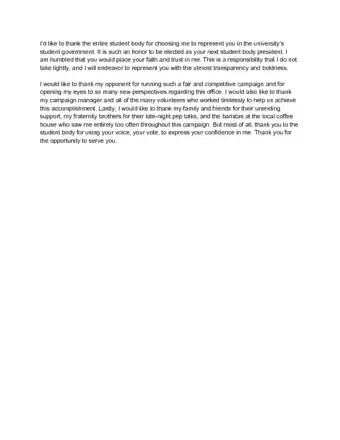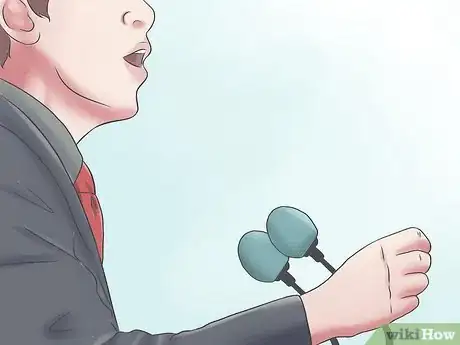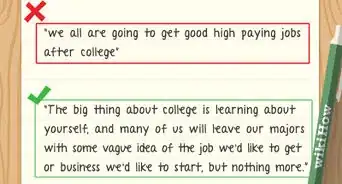This article was co-authored by Lynn Kirkham. Lynn Kirkham is a Professional Public Speaker and Founder of Yes You Can Speak, a San Francisco Bay Area-based public speaking educational business empowering thousands of professionals to take command of whatever stage they've been given - from job interviews, boardroom talks to TEDx and large conference platforms. Lynn was chosen as the official TEDx Berkeley speaker coach for the last four years and has worked with executives at Google, Facebook, Intuit, Genentech, Intel, VMware, and others.
wikiHow marks an article as reader-approved once it receives enough positive feedback. In this case, 100% of readers who voted found the article helpful, earning it our reader-approved status.
This article has been viewed 288,976 times.
Giving an acceptance speech can be a daunting task when you're naturally humble, especially if you've been working so hard earning the accolades that you haven't brushed up on your public speaking skills! Luckily, with the right planning and execution, an acceptance speech can be an opportunity to shine, rather than something that must be suffered through. By following a few basic rules of thumb during the writing and polishing stages of your preparation process and knowing basic standards of speech-giving etiquette ahead of time, you can make your acceptance speech as painless as possible — fun, even!
Steps
Sample Speeches
Writing a Great Speech
-
1Don’t plan to “wing it.” For any public speaking event, planning and preparation is key. Even if the speech you’ve been asked to give is only a minute long, preparing and organizing your thoughts beforehand can make the difference between a tepid response and a warm one. ‘’Always’’ devote some time to developing your speech before you step up to the podium. Don’t rely on your natural charisma or your ability to think on your feet — once you’re staring out at the dozens or hundreds of expectant faces in the audience, you may find that your ability to be charming and profound come less naturally to you than you thought.
-
2Know your audience. Like talented authors, good speechwriters know to adjust the content of their speech to fit the needs of their audience. Serious or formal occasions with important guests will require speeches that are similarly formal, while more light-hearted affairs may call for a less serious tone. When in doubt, err on the side of formality — it’s usually less embarrassing to deliver a formal speech at a casual event than vice versa.[1]
- As a general rule, the smaller your audience and the more intimately you know its members, the more casual your speech may be.
Advertisement -
3Start your speech by introducing yourself. Unless you're sure that everyone in the audience will be perfectly aware of your importance, you'll probably want to start your speech with a few brief words about yourself just to give the audience an idea of who you are. This will probably involve briefly listing your position, some important work you've done, and your connection to the honor or award that you're receiving. Keep these remarks short and humble — your goal isn't to build yourself up or brag, but to introduce yourself to people who are unfamiliar with you. Additionally, you may want to be prepared to skip some of your opening remarks if the person who welcomes you to the podium gives you a lengthy introduction.
- For instance, if you're accepting an "Employee of the Year" award at the tech firm you work for, assuming that your audience contains people who don't know you, you may want to begin with an introduction along these lines:
- "Hello. Thank you for honoring me this evening. As you've just heard, my name is Jane Smith. I joined this company in 2009, and since then, I've worked with the marketing, content, and analytics departments in varying capacities. Earlier this year, I had the honor of collaborating with my boss, John Q. Public, on a new data processing system, which is why we're here today."
- For instance, if you're accepting an "Employee of the Year" award at the tech firm you work for, assuming that your audience contains people who don't know you, you may want to begin with an introduction along these lines:
-
4State a clear, defined goal early in your speech. All speeches should have some sort of purpose or "point" — otherwise, why would anyone bother listening? After you've introduced yourself, don't waste time moving to the "meat" of your speech. Try to tell the audience why they should listen and what you hope for them to take away from your speech fairly early on to give them a sense of direction and prepare them for what you have to say.
- Since you’re presumably accepting some sort of award or honor, a good theme to center your speech around is ‘’gratitude’’. Centering at least part of your speech around thanking those who helped you get to where you are makes you appear humble and deserving of the praise you’re receiving, rather than haughty or conceited. In addition to this, you may also want to consider offering advice to your audience or giving some sort of call to action. Whatever you choose, be sure to briefly make your speech's purpose clear in the beginning. For instance, you might want to say:
- "I'm here today to offer my sincerest gratitude to the dozens of people without whom this experience wouldn't have been possible. I'd also like to briefly discuss the role that the idea of "going the extra mile" has played in setting this company apart from the others in the tech field."
- Since you’re presumably accepting some sort of award or honor, a good theme to center your speech around is ‘’gratitude’’. Centering at least part of your speech around thanking those who helped you get to where you are makes you appear humble and deserving of the praise you’re receiving, rather than haughty or conceited. In addition to this, you may also want to consider offering advice to your audience or giving some sort of call to action. Whatever you choose, be sure to briefly make your speech's purpose clear in the beginning. For instance, you might want to say:
-
5Explain how the honor you’re receiving has personal meaning. As you offer your thanks and advice to the audience, try to explain just how important the honor you're receiving is to you. For instance, you may want to mention that the honor is important to you because it's a sign you've earned the respect of the people who are most important in your life. Doing this proves your sincerity and gives the audience an appreciation of the honor being bestowed. It's not just a trophy or a plaque — it has a symbolic importance that goes beyond this.
- One good trick is to call attention to the fact that the honor you’re receiving, while important to you, is less meaningful than the continued honor of simply getting to do what you love. This sort of acknowledgement makes you look humble, passionate, and supremely deserving of your honor. For instance, if you’re receiving a lifetime achievement award for your decades of work as a teacher, you might want to say something like:
- “As much as I appreciate this award and as grateful as I am for it, the greatest reward I’ve ever been given is the simple opportunity to help generations of kids learn how to think critically about the world around them.”
- One good trick is to call attention to the fact that the honor you’re receiving, while important to you, is less meaningful than the continued honor of simply getting to do what you love. This sort of acknowledgement makes you look humble, passionate, and supremely deserving of your honor. For instance, if you’re receiving a lifetime achievement award for your decades of work as a teacher, you might want to say something like:
-
6Wrap up with a concise, powerful ending. The ending of a speech is one of the hardest parts to perfect, but it's also one of the most important because it's the part everyone will have the easiest time remembering. Try to give your ending a serious emotional wallop or a rousing call to action — you're looking to go out with a bang, not a whimper. Try to use words and imagery that have strong emotional resonance. For your last sentence, try to end with a witty observation or a powerful statement of truth.
- For instance, in the teacher example above, we might end like this:
- "As we leave here today, I'd like to ask the members of the audience to take a moment to think about the importance of educating the children of this generation. Tomorrow's problems demand bright, hard-working individuals to solve them, and the only way we can create these individuals is by acting as a community to support our schools, our teachers, and the countless people that they depend on for their continued strength."
- For instance, in the teacher example above, we might end like this:
-
7Be sure to thank anyone who helped you succeed. This is an absolute must for acceptance speeches — somewhere in your speech, you need to thank the people who helped you succeed, even if, in your opinion, their help wasn't that essential. Forgetting to graciously thank the people who contributed to your achievement can potentially lead to hurt feelings and embarrassment for you. This is easily avoided by devoting some of your speech to personally thanking as many people who worked with you or supported you as possible (preferably near the beginning or end of your speech so that this is well remembered).
- When you're thanking people, it's a wise idea to end with something along the lines of, "and finally, I'd like to thank everyone else who supported me during my work — there are too many people to list, but I want to thank you all personally." This covers your bases in case you forget anyone who played a minor role in your success.
-
8Look for inspiration from the greats. If you're having a hard time penning your speech, consider turning to famous acceptance speeches for ideas on how (and how not) to proceed. Modern history is full of examples of great (and terrible) acceptance speeches that can be used as inspiration. Just a few notable examples are listed below:
- As a positive example, consider Jimmy Valvano's phenomenal acceptance speech at the 1993 ESPY awards. Just eight weeks before his premature death from cancer, the famed college basketball coach delivered an immensely moving speech to an ecstatic standing ovation from the crowd.[2]
- As an example of what not to do, consider Hilary Swank's Oscar acceptance speech for "Boys Don't Cry" in 2000. Swank accepted her award gratefully, doling out thanks to all of her supporters, with the major exception of her husband, whom the cameras famously caught crying tears of joy during Swank's speech.[3]
- As an oddball example, consider Joe Pesci’s Oscar acceptance speech. After taking the podium at the 1991 Oscars for his work in "Goodfellas," Pesci said simply, "It's my privilege. Thank you." Pesci was both praised and lampooned for his five word speech.
Polishing Your Speech to Perfection
-
1Keep things simple. Unlike written text, oral speech can't be "re-read" — once you say something, it's been said, and your speech continues whether your audience understood it or not. To minimize the chance for misunderstanding and keep your audience's attention throughout your speech, keep your words simple. Use clear, concrete language. Don't make your sentences (or the entire speech) any longer than it needs to be to communicate the points you're trying to get across. People are much more likely to have a favorable impression of a short, simple, powerful speech than they are of a long-winded, complicated, and meandering one.
-
2Aim to have at least the basic gist of your speech memorized. For long speeches, it may be impractical or even impossible to have every word of your speech memorized. However, even in these cases where having an outline or a copy of the speech handy is a virtual necessity, you'll still want to have all of the main points you intend to address in your speech ready in your head before you begin speaking. Be sure to know what the main points of your speech are, what order they come in, and any key transitions or examples you use.
- Knowing the outline of your speech ahead of time is useful for multiple reasons. For instance, not only will this prevent certain technical snafus (for instance, a breeze carrying your speech away) from derailing your speech, but it can also help you deliver your speech more confidently. After all, if you know basically what you need to say ahead of time, what need is there to worry?
-
3Make your speech your own. Mediocre speeches are a dime a dozen. Make your speech memorable by making it something only you could deliver. Craft your speech into a product of your own personality — give your audience opportunities not just to remember the speech itself, but also the person giving it. One easy way to do this is to include brief, memorable personal anecdotes in your speech that are pertinent to the honor you're receiving or the themes you're addressing in your speech. Include these as you please, but don't forget to exercise restraint — remember, short and simple speeches are blessings to most people in the audience.
-
4Keep any humor short and dignified. Humor has a place in some acceptance speeches. A witty remark is a great way to break the ice at the beginning of a speech and a few jokes peppered throughout can help keep the audience's attention. However, keep the amount (and type) of humor you use under control. Don't rely too excessively on constant joking and don't include lewd, offensive, or controversial jokes. Unless you're a professional entertainer, your audience probably expects a pleasant, dignified speech, rather than a raunchy, joke-filled tirade, so give it what it wants.
- Also, don’t forget that there may be people in the audience who were in the running for the honor you ended up receiving. Because of this, you won’t want to demean the organization that’s honoring you or jokingly imply that you were a bad choice. Maintain respect for yourself, the organization honoring you, and the audience as you accept your award.
-
5Practice, practice, practice. Like writing, singing, or acting, speech-giving is an art form. The more you do it, the better you become. Though it's impossible to replicate the experience of standing in front of your audience and giving your speech for real before you actually have to do it, practicing alone or in front of a smaller audience can help you memorize the main points of your speech and get enough experience delivering it that it becomes familiar to you. In addition, practice can also help you pin down problems ahead of time. For instance, if there's part of your speech that your test audience doesn't react as well to as you thought it would, you may take this as a sign that it should be removed or edited before the actual speech.[4]
- As you practice, time yourself. You may be surprised how much longer (or shorter) your speech is than you thought it would be. If you have a hard time limit for your speech, use the results of your timed practice to edit your speech as necessary.
-
6Proofread for technical errors. If you're using a written copy of your speech or an outline to keep you on-track, be sure to edit this aid both for its factual accuracy and for proper conventions of grammar, spelling, and sentence flow. One of the absolute most-embarrassing places you can discover an error in your speech is on the podium while you're delivering it, so avoid this awkward situation by thoroughly proofreading your first draft at least once or twice before your speech.
Delivering your Speech with Dignity
-
1Manage your anxiety with stress-fighting techniques. When you're waiting for your turn to speak at the podium, calm, quiet relaxation will probably be the last thing on your mind. However, knowing how to calm your nerves ahead of time can make an otherwise stressful speech a relative breeze.[5] Below are just a few patented techniques to help minimize problems caused by a case of the jitters during your speech:[6]
- Rapid heartbeat: Breathe deeply and slowly. Concentrate on someone in the room you're comfortable around, like a friend or family member. Start delivering the words of your speech — you'll naturally relax once you start talking.
- Racing, panicked thoughts: Take deep breaths. Look out into the audience and see the humor in their blank, expressionless faces. Alternatively, imagine that the members of the audience are somehow unimportant or laughable (e.g., that they're all in their underwear, etc.)
- Dry mouth: Bring a bottle of water with you onstage to drink as you need it. Consider also chewing gum before (but not during) your speech. Mimicking the process of eating can have a calming effect on the emotions. In addition, it can stimulate saliva production, preventing a dry mouth.
- Trembling: Breathe deeply and slowly. If necessary, try slowly tensing and releasing the muscles in the trembling body part to work out the excess energy from your adrenaline high.
- Above all, relax. You've prepared, so you have no reason to worry about how the speech will turn out. Worrying will only make it harder to deliver the great speech that you're perfectly capable of giving.
-
2Know what to avoid. Even people who otherwise have no tics or neuroses sometimes develop strange repetitive behaviors when put under pressure in public. The best cure for nearly any sort of tic is to relax with the techniques listed above. However, in addition, making a mental list of common speech-giving tics ahead of time can allow you to catch them if you notice them appear while you're delivering your speech. Below are just a few of the most common problems you'll probably want to avoid:
- Hurrying or rushing through your speech.
- Mumbling
- Fidgeting or messing with something in your hands
- Swaying from side to side.
- Coughing/sniffling excessively
-
3Speak slowly and clearly. As noted above, one of the most common problems that inexperienced speakers have is that they can tend to rush or mumble through their speech unintentionally. The way you speak when you're giving a speech shouldn't be the same way you talk to people you're close to in a casual setting — you want to speak slower, more clearly, and somewhat louder than you normally would. This doesn't necessarily mean you have to dwell on every word and take long pauses between your sentences, just that you should make an effort to ensure that even the hard-of-hearing in the audience can understand you.[7]
-
4Make eye contact. When you give an acceptance speech, you're addressing the audience, so you'll want to look at the audience for most of your speech just as you'd look at the person you're addressing if you were talking to only one person. It's OK to give the notes or the outline you have with you a quick look to keep your speech on-track. Try to limit this to short glances no longer than a few seconds or so long. The rest of the time, hold your head high and speak directly to the audience in front of you.
- If you can remember to do so, try to gradually move your gaze from side to side as you look at your audience. Sweeping your eyes back and forth gives the members of the audience the impression that you're addressing them all individually. If this "sweeping" motion is tricky for you, try randomly picking individuals in the audience to look at for a few seconds at a time as you talk.
-
5Remember that everyone in the room is a human being. To someone who's nervous about giving a speech, the audience can seem like one big, scary, imposing entity that must be confronted and appeased. In fact, the audience is anything but this — it's actually made up of many different individuals, all of which have their own internal motives and preoccupations (just like you!) Some of the people in the audience may be thinking about their own problems or simply daydreaming while you give your speech. Others may be practically (or literally) asleep. Some may not even be intelligent enough to understand your speech! On the other hand, some may find your speech interesting or important. Few, however, are likely to find it as important as you do, so don't be scared by your audience! Thinking of your audience as a collection of real, imperfect people, rather than as a faceless, monolithic crowd is a sure-fire way to make it easier to relax.
Expert Q&A
Did you know you can get expert answers for this article?
Unlock expert answers by supporting wikiHow
-
QuestionWhy do I get nervous and scared when I give a speech?
 Lynn KirkhamLynn Kirkham is a Professional Public Speaker and Founder of Yes You Can Speak, a San Francisco Bay Area-based public speaking educational business empowering thousands of professionals to take command of whatever stage they've been given - from job interviews, boardroom talks to TEDx and large conference platforms. Lynn was chosen as the official TEDx Berkeley speaker coach for the last four years and has worked with executives at Google, Facebook, Intuit, Genentech, Intel, VMware, and others.
Lynn KirkhamLynn Kirkham is a Professional Public Speaker and Founder of Yes You Can Speak, a San Francisco Bay Area-based public speaking educational business empowering thousands of professionals to take command of whatever stage they've been given - from job interviews, boardroom talks to TEDx and large conference platforms. Lynn was chosen as the official TEDx Berkeley speaker coach for the last four years and has worked with executives at Google, Facebook, Intuit, Genentech, Intel, VMware, and others.
Public Speaking Coach If you're afraid of talking in front of an audience, it may be due to the spotlight effect. You feel uncomfortable in the spotlight. This is likely due to something that happened in your past. Maybe you made a mistake in your past, or you were scolded while you were speaking, or something like that. So this gets patterned into your nervous system. One of the first things that needs to happen is for you to get comfortable making eye contact, comfortable with people looking at you, and comfortable with talking while making eye contact. You can practice this just be being mindful of this while you're talking to groups of people and strangers. With practice and mindfulness, these feelings should go away over time.
If you're afraid of talking in front of an audience, it may be due to the spotlight effect. You feel uncomfortable in the spotlight. This is likely due to something that happened in your past. Maybe you made a mistake in your past, or you were scolded while you were speaking, or something like that. So this gets patterned into your nervous system. One of the first things that needs to happen is for you to get comfortable making eye contact, comfortable with people looking at you, and comfortable with talking while making eye contact. You can practice this just be being mindful of this while you're talking to groups of people and strangers. With practice and mindfulness, these feelings should go away over time. -
QuestionWhat is the purpose of an acceptance speech?
 Community AnswerTo let other people know how you feel about the award/promotion you have won and to thank those who helped you achieve it.
Community AnswerTo let other people know how you feel about the award/promotion you have won and to thank those who helped you achieve it. -
QuestionHow do we greet the audience?
 Rikki ArundelCommunity AnswerIf you are asking how to start a speech when you first step up in front of them - don't greet them immediately. Make sure that you get someone to introduce you first - Bring your own introduction typed up - 30 seconds of text - about one short paragraph of 75 words that explains who you are, and why you are the best speaker for this topic at this time for this audience - do not leave this to the introducer to write. Then launch straight into your speech opening with a fact, a story, or a statement - designed to grab the audiences attention and get them wanting to hear what you have to say. Once you have them - then you can greet them and tell them your goal for the speech.
Rikki ArundelCommunity AnswerIf you are asking how to start a speech when you first step up in front of them - don't greet them immediately. Make sure that you get someone to introduce you first - Bring your own introduction typed up - 30 seconds of text - about one short paragraph of 75 words that explains who you are, and why you are the best speaker for this topic at this time for this audience - do not leave this to the introducer to write. Then launch straight into your speech opening with a fact, a story, or a statement - designed to grab the audiences attention and get them wanting to hear what you have to say. Once you have them - then you can greet them and tell them your goal for the speech.
References
- ↑ Lynn Kirkham. Public Speaking Coach. Expert Interview. 20 November 2019.
- ↑ http://www.jimmyv.org/about-us/remembering-jim/jimmy-v-espy-awards-speech/
- ↑ http://www.hollywoodreporter.com/news/oscars-acceptance-speech-flubs-422360
- ↑ Lynn Kirkham. Public Speaking Coach. Expert Interview. 20 November 2019.
- ↑ Lynn Kirkham. Public Speaking Coach. Expert Interview. 20 November 2019.
- ↑ http://www.cypressmedia.net/articles/article/19/overcome_your_fears_and_become_a_great_speaker
- ↑ Lynn Kirkham. Public Speaking Coach. Expert Interview. 20 November 2019.
- http://www.sideroad.com/Public_Speaking/acceptance_speech.html
- http://www.write-out-loud.com/acceptance-speeches.html
About This Article
To give an acceptance speech, start by introducing yourself, then get right to the main theme of your speech. Keep your words simple, speak slowly and clearly, and try to center at least part of your speech around thanking those who helped you get to where you are. Explain what personal meaning the honor holds for you, then wrap up your speech with a concise, powerful ending! For tips on polishing and practicing your speech, read on!


















































































